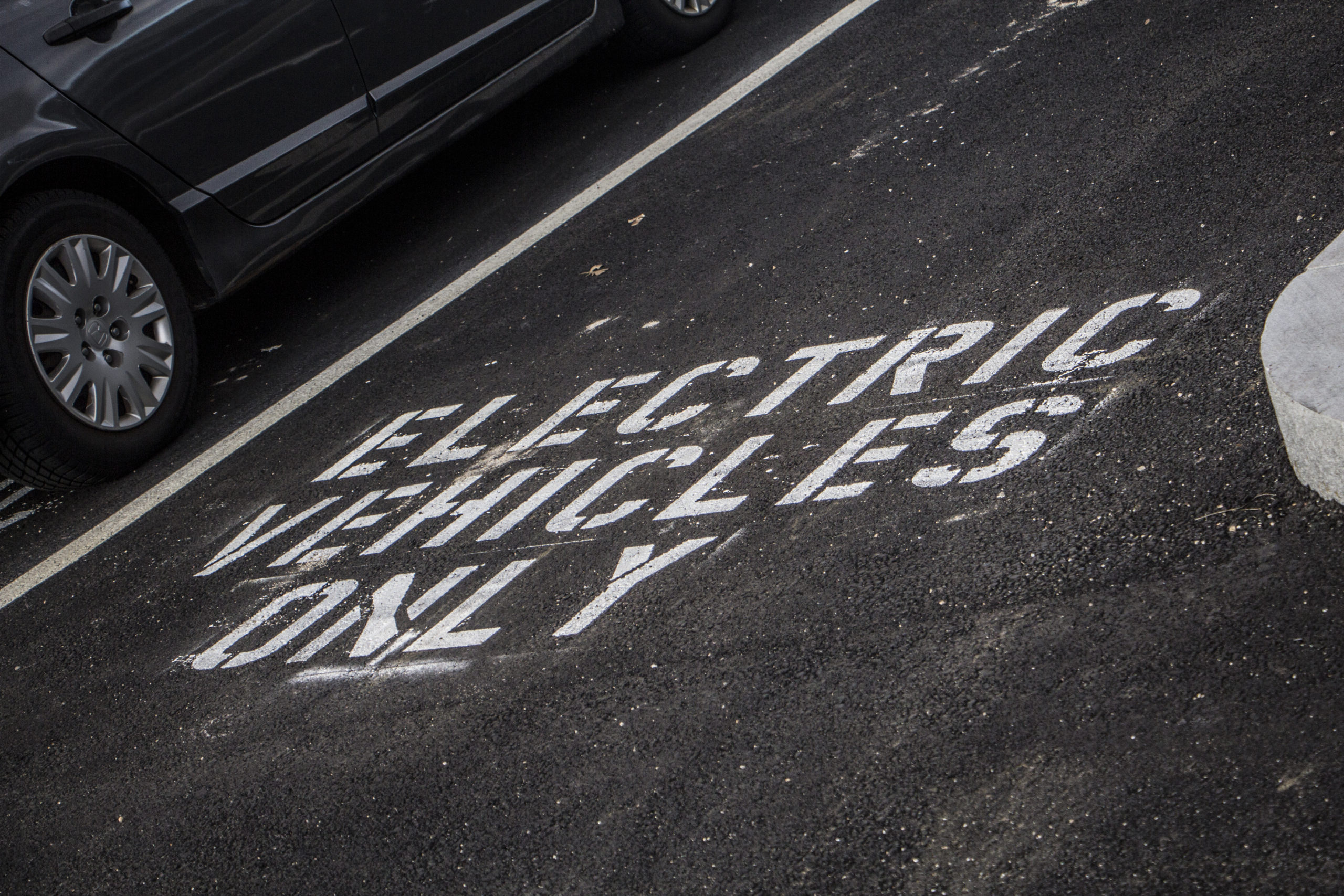With electric cars on the rise, URI is now designating charging stations solely for their use. Photo by Greg Clark.
As concerns about carbon emissions reach fever pitch, more people are switching to electric vehicles (EVs) each year. At the University of Rhode Island, some believe that the supply of EV charging stations does not meet the growing demand.
Several EV charging stations currently exist on the Kingston campus to help satisfy the needs of the 66 EVs registered to park on campus. 50 of these EVs are owned by faculty and staff, 10 by students at the Osher Lifelong Learning Institute and six by students.
The stations are manufactured by the company ChargePoint, and each station can charge up to two vehicles at a time. A full charge takes about four hours. One station is located outside of the Mallon Outreach Center and was installed in 2013. The Brookside Apartments also offer several charging stations for residents, as well as a station outside of Green Hall.
However, commuters find that stations are often overcrowded, with many EV drivers wishing to use them at the same time. This leads to long waits to use stations, which EV users can track via an app.
Christopher Pepper, an EV owner and network technician for URI, said that he has seen up to 12 vehicles fight to use the Mallon Outreach Center charging station.
“If you’re number six or seven [on the waitlist], you’re never going to get a chance to charge during the day because there are only two charging points,” Pepper said.
Rob Coyne, a physics professor and hybrid owner, said there are numerous EV charging stations in Providence. He believes that as more people adopt sustainable lifestyles, demand for charging stations will increase and the University will not be prepared for it.
“I think even just another station would go a long way to alleviating it,” Coyne said. “Don’t get me wrong, not every place has the facilities, but I do think that as time goes on and more EVs come in use, we are going see more.”
Even staff whose jobs directly involve EVs have found difficulty charging their cars on campus. Last year, the Department of Public Safety purchased two EVs to become more environmentally friendly, but they also found difficulty charging on-campus.
“There are still no EV chargers at any of Public Safety’s three campus locations,” Samuel Adams, assistant director of public safety, said.
Since purchasing the EVs, public safety has struggled with finding easy access to charging. They have opted not to purchase further EVs before more charging stations can be implemented.
Another station located behind the Welcome Center has not been active. Marsha Garcia, campus sustainability officer, said the Mallon Outreach Center station works because it is owned by National Grid, not the University. This station hasn’t been activated due to a lengthy contract process with Chargepoint, which would allow the station to be activated under the ownership of the University instead.
Garcia also said that with plans to install more charging stations, the University may opt to cover future charging stations under a single contract.
“Part of the reason why it is inactive is because we are trying to work out a contract with ChargePoint,” Garcia said. “When it became apparent that we’re going to be adding [charging stations] ourselves, instead of going through that same headache every station, we thought, ‘Let’s just get all of them on the same page so you only have to review one contract and have it all up at the same time.’”
Garcia added that the Welcome Station station should be activated by late February as contracts near completion.
University administrators support implementing more charging stations in accessible areas such as commuter lots. Vice President of Administration and Finance Abigail Rider explained that she is working with Garcia, campus planning and other departments to create a comprehensive plan for EV charging stations.
“We want to add more [charging stations],” Rider said. “Part of what we’re doing is we’re making a plan to determine how many charging stations in what locations and then as demand increases, we’ll add them.”
Charging vehicles require significantly more energy than charging laptops or phones, and as such, can raise the University’s electricity bill. Rider suggested that the University could charge EV owners for using the stations, as the University does not currently do so.
“With 10 cars, you don’t notice the power bill, but how are people going to pay for the power they are going to use?” Rider said. “We don’t pay for the gas people use to get here, why should we pay for the power? We just need to figure out a fair way to charge for power.”

